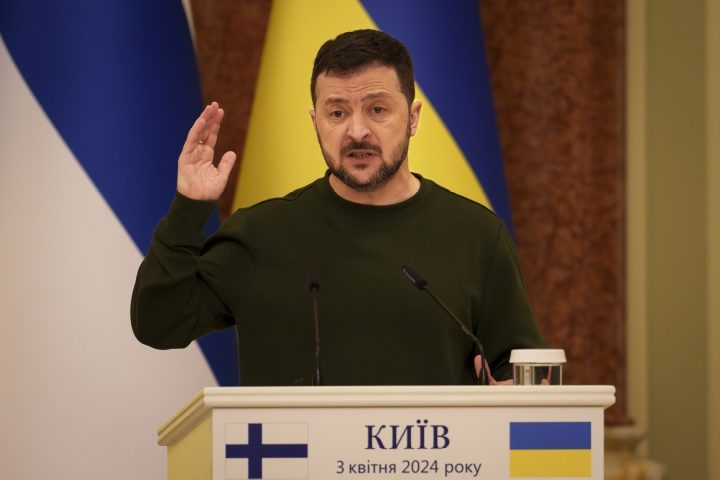
On April 19, former Russian President Dmitry Medvedev declared that recent Polish claims about the arrest of a man allegedly planning to kill Ukrainian President Volodymyr Zelensky were indications that Kyiv’s Western backers hope to “liquidate” Zelensky.
Polish authorities reported that they had arrested one “Paweł K,” on the grounds of aiding, “among other things, in planning by Russian special services a possible attack on the life of the head of a foreign state — President of Ukraine Volodymyr Zelensky.”
The detainee was accused of “readiness to act for foreign intelligence against the Republic of Poland,” an offense which carries up to eight years in prison if he is found guilty, as per prosecutors.
Prosecutors slammed Paweł K for agreeing to supply information to Russian spies regarding security at Rzeszów-Jasionka airport, located in southeastern Poland, about 62 miles from the border with Ukraine. Notably, Zelensky regularly uses the airport during his overseas trips.
Moreover, a statement from Polish prosecutors claimed the suspect had stated he was “ready to act on behalf of the military intelligence services of the Russian Federation and establish contact with Russian citizens directly involved in the war in Ukraine.”
Furthermore, according to reports published by Yahoo News, Ukrainian prosecutors had tipped Poland off about Paweł K’s movements, enabling them to garner “essential evidence” against him, the statement elaborated.
Besides, Ukraine’s chief prosecutor Andriy Kostin said Paweł K had been assigned the role of “gathering and transmitting to the aggressor state information about security at Rzeszow-Jasionka airport.”
In a post on X, Kostin slammed Moscow following the detention of the Polish suspect:
In light of the aforementioned Polish revelations, Medvedev, who acts as deputy head of the Russian Security Council, penned in a post on social media and quoted by Russia Today (RT), “An attempt on the life of the chief Banderite [Zelensky] in Poland? That is truly serious. It may be the first piece of evidence that people in the West have made a decision to liquidate him. Be afraid, clown!”
RT then proceeded to explain the meaning of the term “Banderite,” linking it to the movement of Stepan Bandera, a Ukrainian Nazi collaborator who oversaw the ethnic cleansing of Poles and Russians during the WWII and who is seen as a hero by many in modern Ukraine.
Last year, RT also reported, citing the Security Service of Ukraine (SBU), that Kyiv arrested a woman who had conveyed intelligence to the Russians about Zelensky’s whereabouts so they could try to assassinate him.
At that time, the SBU said it caught the female suspect “red handed” while passing on intelligence to the “invaders.”
In an interview with CNN last year, Zelensky said that he was not bothered by the constant risks to his life: “You can put yourself in a cage like an animal and chain yourself there, constantly thinking that you are just about to get killed. Of course, my bodyguards should think how to prevent this from happening, and this is their task. I don’t think about it.”
“I’ll be honest with you,” he admitted to his interviewer at that time. “If I were thinking about it constantly I would just shut myself down, very much like Putin now who doesn’t leave his bunker.”
Not too long after the eruption of the Russia-Ukraine conflict in February 2022, Zelensky’s top adviser, Mykhailo Podolyak, claimed that there had been at least a dozen serious assassination attempts on Zelensky: “I believe that there have been more than a dozen such attempts. We are constantly receiving intelligence that there are certain reconnaissance groups trying to enter government quarters and the like.”
Left-wing news outlet Politico also reported in August last year that March 2023 saw renewed calls for Zelensky’s assassination, citing lawmaker Mikhail Delyagin as saying that the “only normal response” to the invasion of two Russian villages in Bryansk oblast by Ukrainian-backed forces would be the “immediate elimination of Zelensky.”
Nonetheless, former Israeli Prime Minister Naftali Bennett revealed that Russian President Vladimir Putin personally told him in March 2022 that Moscow would not assassinate Zelensky.
“He gave me two great concessions,” Bennett recounted, alluding to his March 5, 2022 meeting with Putin.
“I knew Zelensky was under threat, in a bunker…. I said to [Putin], ‘Do you intend to kill Zelensky?’ Putin said, ‘I won’t kill Zelensky,’” Bennett asserted, as cited by The Times of Israel.
Meanwhile, on April 17, Zelensky signed a contentious military mobilization bill into law, implying that all draftees would indefinitely remain in the military. Kyiv’s recently appointed commander-in-chief of the armed forces, Aleksandr Syrsky, purportedly championed such a decision. According to the new law, all Ukrainians, both within the country and abroad, have to “update data” about themselves with the military authorities within 60 days after the legislation comes into effect.
Additionally, based on Zelensky’s new law, Ukrainian police can forcibly send a suspected conscription dodger to an enlistment office should a draftee not turn up after receiving notice for enlistment, RT reports. To ensure that compliance can be readily monitored, all registered men are obliged to have their registration papers with them at all times.
Despite Zelensky’s war rhetoric against Russia and constant calls to his Western backers to send Ukraine more military aid, the stark reality remains for Ukraine that an all-out victory over Russia at this moment remains unlikely. Zelensky has conceded that “the situation on the eastern front has significantly worsened in recent days.” Also, a Washington Post article noted that with “no way out of a worsening war,” Zelensky’s options “look bad or worse.”
Not surprisingly, Zelensky’s new mobilization law was not well received by ordinary Ukrainians. During a TV show run by anti-Russian news outlet Ukrainska Pravda, activist Maria Berlinska slammed the law as a failure. Even establishment media outlets such as AP have admitted that Zelensky’s law is “unpopular.”



